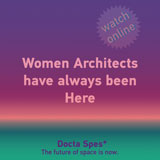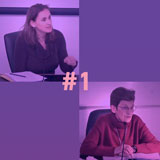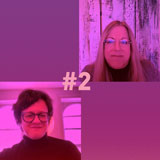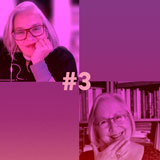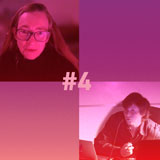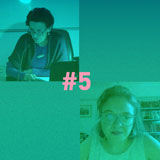Scientific meeting
Women Architects have always been Here
15 February 2023
Auditorium, Department of Architecture UTH, Pedion Areos, Volos.
Curated and organized by:
Petros Phokaides
Scientific and organizational contribution:
Iris Lykourioti, Kostas Manolidis
On Wednesday November 15, 2023 the Department of Architecture, University of Thessaly organized as part of the series of scientific meetings Docta Spes*. The future of space is now the scientific meeting Women Architects have always been Here.
The meeting highlights the importance of gender and feminist approaches in architectural design, academic research, and collective action. It seeks to reflect on architecture as a potential field of dialogue between situated, feminist, queer, anti-racist, decolonial and de-growth perspectives and innovative models of production, work, and design. It thus attempts to articulate critical, affirmative, and hopeful responses to the future of architecture and to contemplate innovative (design) pedagogies that have spatial, intersectional, and climate justice at their core.
Docta Spes* and the Principle of Hope
If something seems to continuously transverse our contemporary era is a long-lasting agony and the eclipse of hope. Extensive environmental disasters, current and emerging pandemics, wars, the challenges of climate change, the growing social and economic inequalities that leave their indelible traces on our built environment, the resilience of corruption and even the threat for our own extinction make us confront the fragility of our world that becomes more and more inconceivable.
In reference to The Principle of Hope (Das Prinzip Hoffnung) of the German Philosopher Ernst Bloch a series of scientific meetings will be held at the Department of Architecture of the University of Thessaly. The meetings aim at the re-examination of the creative importance of docta spes, the educated or apprehended hope that emerges as a result of the assessment and scrutiny of a specific situation. Only a ‘hope through knowledge’ stops being a false desire or sentiment, a passive contemplation, and becomes the education of desire, a precise anticipation; a latent trend of the realistically possible that does not only define our future but our present as well:The future of space is now.
Women Architects have always been Here
The meeting entitled "Women Architects have always been Here" is part of the series of scientific meetings "Docta Spes: The Future of Space is Now", which was launched in November 2022 by the Department of Architecture, University of Thessaly (UTh) and adopts its aim of “reflecting on the need to design a future that is habitable and socially inclusive.” It brings into dialogue distinguished architects, historians, theorists, researchers, and artists who have developed extensive interdisciplinary work at an international level. At the core of their studies and practices are feminist theories, methodologies, and practices as these take shape in diverse geographical contexts and intersect with different disciplines, from architectural historiography, art, curating, gender studies, geography, political ecology, architectural and urban design. The contributions and discussions in this meeting further draw on perspectives from archives, teaching, research, and social activism and will be a catalyst for reflection on the present and future of architectural education.
The meeting emphasizes the importance of feminist approaches and scientific discussions on gender in (architectural) education and research and at the same time seeks to broaden the perspective of architecture, design, and space in gender studies. In doing so, it attempts to expand critical, innovative, and interdisciplinary debates that unfold within the Greek public university, and internationally. For this endeavor, we also draw on the rich legacy of relevant educational/research projects developed at the Department of Architecture, UTh, as well as other Departments/Schools of Architecture in Greece in the recent past. The recent adoption of the Institutional Action Plan for the Promotion of Gender Equality 2022-2025at the University of Thessaly; the research and publishing activities of the Centre for New Media and Feminist Practices in Public Space, and the publication of Femarch: Digital Archive of Greek Women Architects 1923-1981, inform in different ways the objectives of this meeting. Finally, the statistical predominance of female architects in education and in the profession and the questioning of gender hierarchies and identities by younger generations of students inspire us to connect, through this meeting scientific discussions with social realities and experiences.
The meeting departs from the stated absence of women architects from the historiographical canon, architectural archives, education, and the mainstream architectural culture. It draws on contemporary debates in architectural history and theory that trace the multiple implications of this absence in the reproduction of dominant discourses in the study and design of the built environment and space. The meeting emphasizes the importance of illuminating marginalized stories of women architects, urbanists and designers and highlighting their particular experiences, the trajectories and collaborative projects they developed, ultimately, transcending the 'master' hero architect paradigm. By highlighting the understudied work of the women architects, the meeting aims to contribute to efforts to rethink architectural history and the search for alternative design and social visions.
We understand Despina Stratigakos' question “Where are the women architects?” as a critical and timely call that places historians and theorists of architecture before their responsibilities. It is a critical reflection that redirects the research focus on overlooked histories of women architects, urban planners, and designers, and calls for them to be made visible in curricula, revised architectural history survey books, exhibitions, and collections—engaging archival and academic institutions—with the ultimate goal of contesting the dominant male-centric culture in the profession, academia, and the public sphere. We take the question not only as a call to fill in the gaps in architectural history and archives, but as a demand for sustained academic vigilance to expose, on the one hand, power structures in architectural education, research, and practice, and, on the other, to revise modes of knowledge production by engaging new subjects, geographies, and epistemologies.
In this meeting we are interested to discuss on women architects who have claimed (and continue to claim) the privilege of an academic education in which they are taught, mostly, if not entirely, by male professors, about great men architects and how the model of architectural and urban design is a 'genderless', classless, non-racial, but fundamentally male, heterosexual, white, able-bodied subject. We want to talk about those who did not follow these standards closely and designed spaces for different needs and bodies to facilitate everyday tasks that were considered exclusively "female". We are particularly interested in those who have attempted, and are attempting, to simultaneously challenge and transform the male-dominated field and the heteronormative environment through critical feminist/queer architectural collaborations and participatory practices. By casting the spotlight on their contributions, we want to draw lessons from their work to transcend cognitive and working hierarchies and models of synergies between female architects, designers, workers, and users of spaces.
The meeting aims to highlight the stories of women architects who have been marginalized and the role of 'women' in the production of space. We are particularly interested in the latter, who as ‘women’ and users of spaces have been doubly invisible to architectural theory and historiography. As Dina Vaiou systematically reminds us, it is the “invisible” daily work of ‘women’ that gives value to buildings and the city. We therefore want to understand the social practices that 'women' develop as gendered and racialized bodies in an environment that, while ignoring their needs and often becoming dangerous for their safety, they continue to hold the primary role of caring for and maintaining it. As other ‘architects’ they constitute, and inspire us to imagine, a different paradigm for the production of space based on solidarity, commons, and care. Their everyday struggles for justice inspire us further to question structural hierarchies of private and public, city and countryside, North and South, human and non-human, and to imagine architecture beyond the axes of colonialism, patriarchy and capitalism.
Guest speakers (according to program):
Helen Fessas-Emmanouil (UoA)
Maro Katou (architect - educator, PhD NTUA)
Olga Touloumi (Bard College)
Despina Stratigakos (University at Buffalo)
Zaida Muxí (ETSAB)
Anastasia-Sasa Lada (AUTh)
Sofia Dona (artist - architect)
Elke Krasny (Academy of Fine Arts Vienna)
Maria Fragkou (Universidad de Chile)
Dina Vaiou (NTUA)
Contributions to the open discussion:
Elpida Karaba (UTh, CNMFPP)
Elena Tzelepis (UTh, GEC)
Yorgos Tzirtzilakis (UTh, D’Arch)
Chairing and responses, on behalf of the Department of Architecture (according to program):
Katerina Chatzikonstantinou, Valia Papastamou, Fani Paraforou, Fabiano Micocci, Vaso Trova, Anthi Kosma, Zisis Kotionis, Αspasia Kouzoupi, Phoebe Giannisi
Technical support, media, video and post production
Computer Center
(online transmission,screen recording)
Ioannis Komninos, Ioannis Manis
Laboratory of Environmental Communication & Audiovisual Documentation
(photography, sound and video recording, editing, montage and post production)
Spiros Papadopoulos, Vassilis Bourdakis, Ifigenia Charatsi, Giorgos Kalaouzis, Eleni Pispiri, Nikos Vamvakas
Student team:
Christina Diamantopoulou, Kalliopi Martinou, Vasileia Poulianiti, Evie Steliou, Alexandra Stergiou
Administration, finance:
Nancy Gata
Department Secretary:
Sofia Koniari


